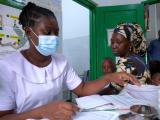Nov 19, 2010
E coli infection may lead to heart, kidney disease later in life
People who drink Escherichia coli–contaminated water and develop gastroenteritis increase their long-term risk of developing high blood pressure, heart disease, or kidney problems, according to a recent study. A research team from Lawson Health Research Institute and The University of Western Ontario reviewed data compiled after an outbreak of gastroenteritis in May 2000 that was caused by E coli O157:H7 and Campylobacter in a municipal water system. Study participants were assessed annually. Of 1,977 adults, 1,067 (54%) experienced gastroenteritis, of whom 378 sought medical attention. Compared with those who were not sick or only mildly sick during the outbreak, those with acute gastroenteritis were 2.1 times more likely to have a cardiovascular event, such as a heart attack or stroke; 1.3 times more likely to develop high blood pressure; and 3.4 times more likely to develop renal impairment.
Nov 17 BMJ abstract
Nov 19 University of Western Ontario press release
KPC antibiotic resistance factor found in 35 states
Bacteria that carry the potent antibiotic-resistance enzyme known as KPC have been found in 35 states and are probably present in all 50 states, Dr. Ruth Lynfield, Minnesota's state epidemiologist, said at a Minneapolis conference on emerging infections today. KPC, or Klebsiella pneumoniae carbapenemase, renders Klebsiella and several other bacterial species resistant to carbapenem and nearly all other antibiotics and has been described as one of the most worrisome resistance problems in the United States. It was first identified in New York City in 2000. Lynfield said 25 bacterial isolates carrying the KPC gene have been detected in Minnesota so far. In other comments, Lynfield said antibiotics are "tremendously overused" in the US, with 115 million to 150 million outpatient prescriptions each year. She said many child care facilities exclude children who have a thick nasal discharge, acute bronchitis, or a febrile illness until they have been on an antibiotic for 24 hours—a practice that encourages overuse of the drugs.
Nov 19 conference agenda
WHO asks for vigilance against drug-resistant malaria
To combat resistance to common antimalarial drugs, the World Health Organization (WHO) in a report released yesterday called on countries to improve monitoring for resistant strains. The report, which includes data from the past 10 years, estimates that only 34% of malaria-endemic countries comply with WHO recommendations for routine monitoring of the efficacy of first- and second-line antimalarial drugs, including artemisinins, key class of drugs. "A greater political commitment to support and sustain national monitoring of the efficacy of antimalarial medicines is critical to prevent a wider emergence of artemisinin resistance," said one of the report's authors, according to a WHO press release. Artemisinin resistance was brought to light in February 2009 along the Cambodia-Thailand border. Early evidence also indicates such resistance may be emerging on the Myanmar-Thailand border, and there is concern it could spread to Africa. Treatment of the resistant forms is possible with a multi-drug approach, but it typically takes longer, the WHO said.
Nov 18 WHO report
Nov 18 WHO news release




















